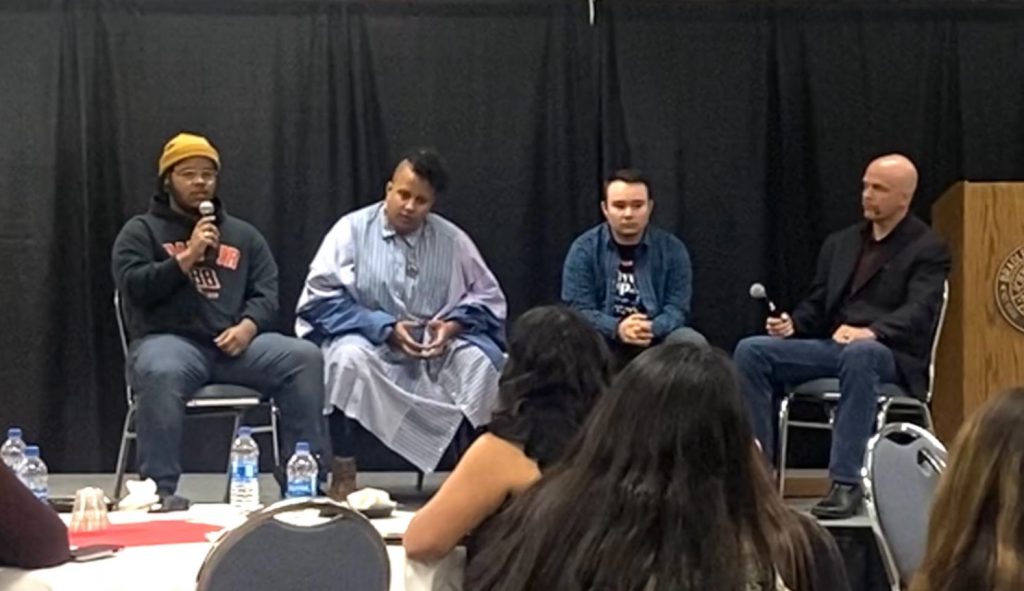
Learning how to be a better ally to the LGBTQ+ community is something that Bradley’s Sigma Lambda Gamma sorority wanted to teach to their peers.
On March 26 in the student center ballroom, the sorority (featuring Brave Space and The Women and Gender Studies Department) hosted four panelists to speak to students on how to be supportive allies to the community.
The event started with a large buffet of food for the audience and speakers to enjoy before the panel officially began.
To start off the panel, all of the speakers introduced themselves and their involvement in the LGBTQ+ community. The panelists were Alexander Martin of Central Illinois Friends, manufacturing engineering technology major Vincent Blissett , associate professor Ryan Reed and Marshall Seidel of Peoria Proud.
The organizers of the event, senior psychology and Spanish major Marianna Rodriguez and junior health science major Katya Bustos, compiled a list of questions for the panel to answer and explain to the audience.
Important topics covered in the panel included the topic of pronouns among transgender youth and their struggles with people misgendering them by using the wrong pronouns. Martin, a trans woman, spoke on how an ally can aid in stopping those who misgender others.
“It’s usually nice to just correct them — ‘Oh, this is their name, these are their pronouns’ — but sometimes … sort of keep things low,” Martin said. “When I refer to the person, I will use their correct name and pronouns … if I’m like, ‘She’s doing great, I just saw her yesterday,’ they’re like, ‘Oh, crap,’ and they remember.”
One of the questions prompted Seidel to discuss his struggle with trying to find allyship with his own family, specifically his grandma, after coming out as transgender. He shared with the audience that no one should have to beg with their family to be accepted and loved and that, despite all of his hardships, he found family inside the community and with allies.
“It’s awful; you should never have to fight with a family member to be seen as who you are — it’s not fair,” Seidel said. “They’re your family. It’s their job — it’s like their one job to love and accept you, and if they can’t do that, cut them out.”
Reed stated that no ally should be afraid or have to be asked to show up for support. He further said that no ally should need an invitation to show support to the community and that they should show up on their own accord.
What does an ally look like to you?
“An ally is someone who not only says they are for the community [but] actually fights with the people … [wants] to be there and [wants] to be an advocate as well … to make others not feel like they’re not ‘others,’” Blissett said.
What have been some struggles to find equity within your own communities?
“I lost connection with my father for a year because of it [coming out as transgender],” Blissett said. “I had to beg him to come to my own graduation, but he [would] come to his stepson’s graduation, so that was something that hurt. It was an acknowledgement of the son he always wanted not being the son he wants now.”
Along with the struggles with coming out, the panelists shared their frustrations with the constant coming out to many different people over and over again.
“As Alexander was saying, it’s a series of coming-outs; it’s exhausting,” Reed said. “I got to a point where…when I would come out to someone, I would be like, ‘Can you just tell everyone else you know, too?’ Because I’m out to my parents, out to my family members [and] out to my best friends, I’m kind of tired [of] coming out to everyone else.”
Seidel also discussed growing up in a rural town in Indiana and how he struggled with transphobia, homophobia and racism from his math teacher. He shared how he was targeted during class and constantly failed in the course subjects because she disliked him for his race and his sexual orientation.
For those who are struggling on their journey to be a better ally, what are some things you’d like to see more of to help guide them?
“If you have someone coming out to you and you’re not a member of the population they are sharing with you, just listen to them [and] make space,” Martin said. “Don’t say things like ‘I always knew’ or ‘It’s about time’ or things like that.”
The panelists also covered the topic of how to be better at being an ally even when you mess up, how to become one with the ever-changing world and how it is okay to mess up sometimes as long as you correct yourself and learn from your mistakes.
What are some struggles and or bad experiences you’ve gone through, that wouldn’t go through a heterosexual or cisgender person’s mind?
“The perpetual threat of violence [is something] that I forget that other people don’t have,” Martin said. “With partners, I’m afraid to hold their hand in some spaces; I’m afraid to be seen. It’s always there even in safe spaces [such as] gay bars, queer spaces [or] clubs. The Pulse nightclub shooting … that left a scar on me and other members of my community where it’s like I’m going to go out and enjoy myself with my friends, and that’s the night that we get shot.”
LGBTQ+ resources to reach out to in times of need include The Trevor Project and, on Bradley’s own campus, Brave Space.




